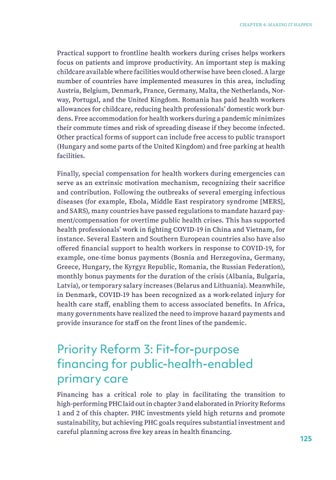CHAPTER 4: MAKING IT HAPPEN
Practical support to frontline health workers during crises helps workers focus on patients and improve productivity. An important step is making childcare available where facilities would otherwise have been closed. A large number of countries have implemented measures in this area, including Austria, Belgium, Denmark, France, Germany, Malta, the Netherlands, Norway, Portugal, and the United Kingdom. Romania has paid health workers allowances for childcare, reducing health professionals’ domestic work burdens. Free accommodation for health workers during a pandemic minimizes their commute times and risk of spreading disease if they become infected. Other practical forms of support can include free access to public transport (Hungary and some parts of the United Kingdom) and free parking at health facilities. Finally, special compensation for health workers during emergencies can serve as an extrinsic motivation mechanism, recognizing their sacrifice and contribution. Following the outbreaks of several emerging infectious diseases (for example, Ebola, Middle East respiratory syndrome [MERS], and SARS), many countries have passed regulations to mandate hazard payment/compensation for overtime public health crises. This has supported health professionals’ work in fighting COVID-19 in China and Vietnam, for instance. Several Eastern and Southern European countries also have also offered financial support to health workers in response to COVID-19, for example, one-time bonus payments (Bosnia and Herzegovina, Germany, Greece, Hungary, the Kyrgyz Republic, Romania, the Russian Federation), monthly bonus payments for the duration of the crisis (Albania, Bulgaria, Latvia), or temporary salary increases (Belarus and Lithuania). Meanwhile, in Denmark, COVID-19 has been recognized as a work-related injury for health care staff, enabling them to access associated benefits. In Africa, many governments have realized the need to improve hazard payments and provide insurance for staff on the front lines of the pandemic.
Priority Reform 3: Fit-for-purpose financing for public-health-enabled primary care Financing has a critical role to play in facilitating the transition to high-performing PHC laid out in chapter 3 and elaborated in Priority Reforms 1 and 2 of this chapter. PHC investments yield high returns and promote sustainability, but achieving PHC goals requires substantial investment and careful planning across five key areas in health financing.
125


